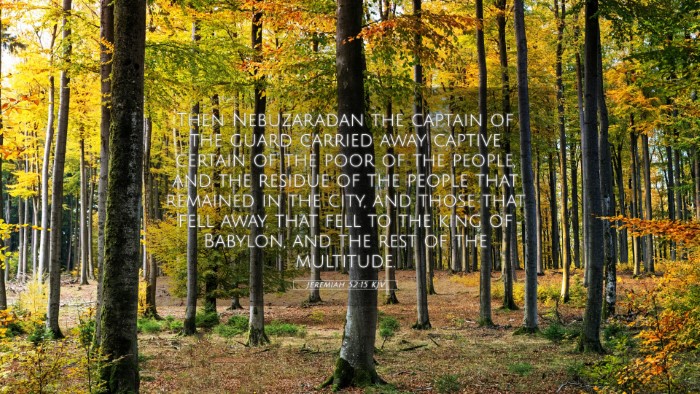Understanding Jeremiah 52:15
Jeremiah 52:15 states: "Then Nebuzaradan the captain of the guard carried away captive certain of the poor of the people, and the residue of the people that remained in the city, and those that fell away, that is, the people that were taken away who were of those that fell to the Chaldeans, and the rest of the multitude." This verse encapsulates profound themes of judgment, exile, and the fulfillment of God’s prophecy.
Context and Background
This verse is situated in the concluding chapter of the Book of Jeremiah, which records the fall of Jerusalem and the subsequent Babylonian exile. Nebuzaradan, a Babylonian officer, symbolizes the executing of divine judgment as foretold by the prophet Jeremiah throughout his ministry.
Thematic Analysis
The analysis of Jeremiah 52:15 reveals several thematic connections:
- Divine Judgment: This verse exemplifies the culmination of God's judgment on the nation of Judah for their persistent rebellion against Him.
- Hope and Restoration: Despite the despair of exile, the overarching narrative of the Bible provides hope for restoration, a theme found throughout the prophetic literature.
- The Nature of Exile: The forced removal reflects both physical and spiritual separation from God, which serves as a cautionary tale for believers.
- God’s Sovereignty: This event underscores God’s control over nations and historical events, a crucial aspect of biblical theology.
Insights from Commentators
Matthew Henry emphasizes this verse as indicative of the consequences of idolatry and disobedience, highlighting that God’s patience had reached its limit. He underscores the idea that the poor left behind were a remnant, symbolizing potential for future hope.
Albert Barnes comments on the significance of the 'captain of the guard' as a tool of divine judgment. He notes that the actions taken against the people were not arbitrary but were in accordance with the prophetic warnings previously given.
Adam Clarke adds that this moment reflects the depths of human suffering as Jerusalem falls, pointing to the emotional and spiritual turmoil that accompanies such devastation. His emphasis draws attention to the necessity of lament and reflection in the face of tragedy.
Cross-References for Further Study
For those interested in deepening their understanding of this verse, the following cross-references provide valuable insights:
- Jeremiah 29:10 - Foretelling of the exile duration.
- Ezekiel 33:11 - God's desire for the wicked to turn from their evil ways.
- 2 Kings 25:11 - Parallel account of the Babylonian exile.
- Lamentations 1:3 - The weeping and desolation of Jerusalem.
- Isaiah 39:6-7 - The prophecy of the Babylonian captivity foretold.
- Zechariah 1:12-13 - Prophetic assurances of God's anger temporarily directed at His people.
- Romans 11:5 - The concept of a remnant preserved by grace.
Cross-Referencing Insights
By utilizing tools for Bible cross-referencing, one can observe the interconnections between Jeremiah 52:15 and related verses, enriching one’s biblical study. Connecting themes such as exile, judgment, and hope across both the Old and New Testaments provides a robust framework for understanding God's redemptive plan.
Cross-Referencing Techniques
- Utilize a bible concordance to locate key words related to exile and judgment.
- Explore a bible cross-reference guide to identify thematic parallels.
- Engage in cross-reference Bible study methods for a deeper understanding of related scriptures.
Conclusion
Jeremiah 52:15 serves not only as a historical account but also as a theological statement about the consequences of turning away from God. By examining the verse through the lens of cross-referencing and theological themes, readers can gain a more comprehensive understanding of God's Word. Studying subsequent references and connecting scriptures can illuminate paths to understanding and application in today's context.




